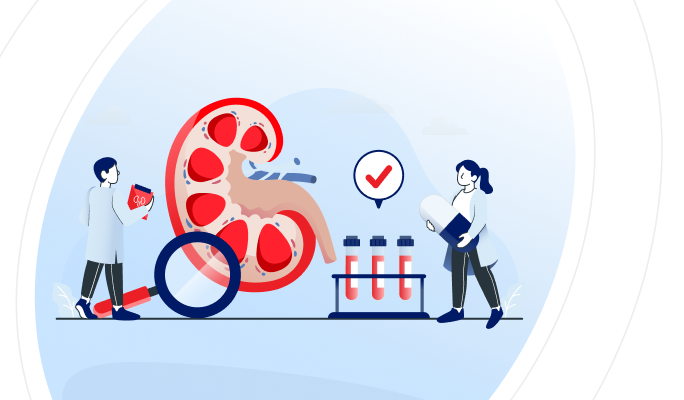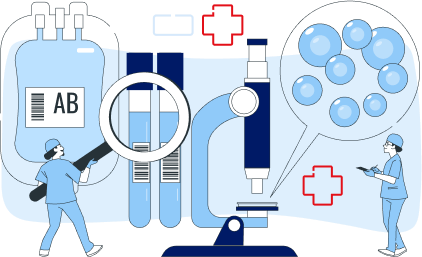Kidney Function Test (KFT)
A Vital Diagnostic Tool
Kidney Function Test (KFT) is an essential diagnostic tool for assessing the health of your kidneys. It is also known as a renal function panel or kidney profile – a series of blood and urine tests designed to evaluate the functioning of the kidneys. It therefore provides valuable insights into how well your kidneys are filtering waste products and balancing electrolytes in your body. Monitoring kidney function is essential for detecting and managing various kidney diseases, such as chronic kidney disease (CKD), kidney stones & urinary tract infections. Early detection through KFT can help prevent further damage and complications.
KFT Test Price in Durgapur - Compare Prices at 5 Labs
Name
Proc. Time
Rating
Price
Book your Kidney Function Test (KFT) test today in
For a more comprehensive understanding, please read the detailed information below. It outlines why KFT is crucial, who should consider getting tested, how someone can prepare for it, what are the potential risks, and how the results can be interpreted.
WHAT HAPPENS IN A KFT TEST?
During a KFT, a healthcare professional will collect a blood and urine sample. The blood sample is analysed for creatinine, blood urea nitrogen (BUN), and other markers of kidney function, while the urine sample assesses protein and other substances. The test is typically quick and relatively painless. To assess kidney function, doctors rely on blood tests which gauge waste removal, toxin clearance, and fluid regulation.
The table below mentions the normal ranges of different kidney function tests:
| Kidney Function Test | Normal Levels | Units |
|---|---|---|
| Blood Urea Nitrogen | 6-24 | mg/dl |
| Creatinine | 0.7 – 1.3 | mg/dl |
| Albuminuria | 30 | mg/dl |
| Uric Acid | 3.5 – 7.2 | mg/dl |

KEY BLOOD TESTS
Serum CreatinineThis measures creatinine levels in your blood, indicative of kidney performance. Elevated levels may signify compromised kidney function, with normal ranges varying based on gender, age, and muscle mass.
Blood Urea Nitrogen (BUN)This test measures urea nitrogen levels, a byproduct of protein breakdown. Healthy kidneys filter urea nitrogen out of the blood, maintaining normal BUN levels (usually between 7 to 20). Elevated levels may indicate declining kidney function.
Glomerular Filtration Rate (GFR)GFR assesses waste elimination efficiency based on serum creatinine, age, and gender. A lower GFR indicates potential kidney dysfunction, with varying interpretations.
A : GFR of 60 or higher, alongside normal urine albumin, falls within the normal range, requiring periodic check-ups.
B : GFR below 60 suggests kidney disease, necessitating discussions on treatment options.
C : GFR below 15 signals kidney failure, possibly requiring dialysis or transplant considerations.

KEY URINE TESTS
Dipstick Urine TestOften part of a comprehensive urinalysis, this quick test detects albumin, a protein produced by the liver. While it doesn’t provide precise albumin measurements, it indicates whether levels are within the normal range. A chemically treated paper strip, or dipstick, immersed in a urine sample changes color if abnormal albumin levels are detected, prompting further testing if necessary.
Urine Albumin-To-Creatinine Ratio (UACR)This test measures albumin levels relative to creatinine, a waste product from muscle breakdown. It quantifies the amount of albumin excreted in urine over a 24-hour period. A UACR result of 30 or higher suggests kidney disease. Results may be confirmed with repeat tests. However, please note that consistent or decreasing urine albumin levels indicate successful treatment, guiding further medical decisions. Your doctor will interpret these results holistically, considering other tests, to tailor a treatment plan aligned with your needs.
An early indicator of kidney disease is the presence of protein in urine, known as proteinuria. To assess protein levels, doctors typically order urine tests.
OTHER TESTS
In addition to blood tests, your doctor may recommend monitoring your blood pressure or conducting further evaluations, such as imaging or a biopsy, to assess kidney health.

Imaging
Diagnostic imaging provides insights into kidney health, identifying any potential issues or damage. These tests assess blood flow to the kidneys and detect blockages or narrowing in blood vessels.

Kidney Biopsy
This procedure involves extracting a small kidney tissue sample for microscopic examination to identify signs of damage or disease. A thin needle is inserted through the skin to collect the tissue, aiding in accurate diagnosis and treatment planning.

Blood Pressure
Given its significant role in kidney disease and failure, blood pressure monitoring is crucial. Effective management of high blood pressure, along with control of blood sugar and cholesterol levels, is essential to mitigate the risk of heart disease/stroke.

HOW TO INTERPRET THE RESULTS?
Interpreting KFT results requires analysis by a qualified healthcare professional. Elevated levels of creatinine, BUN, or abnormal urine findings may indicate kidney dysfunction. Your healthcare provider will review the results with you, discuss any abnormalities, & recommend further testing or treatment if necessary. Regular Kidney Function Tests are essential for maintaining optimal kidney health & detecting potential issues early on. By understanding the importance of KFT & prioritising regular screenings, you can take proactive steps to protect your kidney function and overall well-being. If you have any concerns about your kidney health, consult with your healthcare provider & schedule a KFT on www.flebo.in!

How To Prepare For A KFT Test ?
To ensure accurate results, it’s essential to follow pre-test instructions provided by your healthcare provider. This may include fasting for a certain period or avoiding certain medications that could interfere with the test results. Be sure to drink plenty of water before the test to stay hydrated.

RISKS ASSOCIATED WITH A KFT TEST?
KFT is generally safe and carries minimal risks. Some individuals may experience minor discomfort or bruising at the site of blood collection. In rare cases, there may be a slight risk of infection or excessive bleeding.






